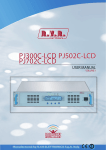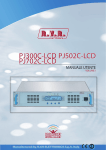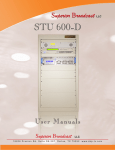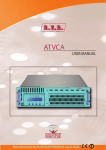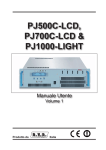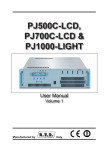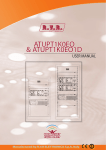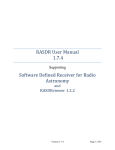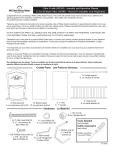Download User Manual - RVR Elettronica SpA Documentation Server
Transcript
ATVCA User Manual Volume 1 Manufactured by Italy File Name: 03_ATVCA_ING_1.0.indd Version: 1.0 Date: 04/06/2010 Revision History Document History Date Version 04/06/10 1.0 Reason First Edition Editor E. Montagna ATVCA - User Manual Version 1.0 © Copyright 2010 R.V.R. Elettronica SpA Via del Fonditore 2/2c - 40138 - Bologna (Italia) Telephone: +39 051 6010506 Fax: +39 051 6011104 Email: [email protected] Web: www.rvr.it All rights reserved Printed and bound in Italy. No part of this manual may be reproduced, memorized or transmitted in any form or by any means, electronic or mechanic, including photocopying, recording or by any information storage and retrieval system, without written permission of the copyright owner. ATVCA Table of Contents 1. 2. 3. 3.1 3.2 4. 4.1 5. 5.1 5.2 5.3 5.4 6. 6.1 6.2 6.3 7. 8. 8.1 8.2 8.3 8.4 8.5 8.6 9. 9.1 Preliminary Instructions Warranty First Aid Treatment of electrical shocks Treatment of electrical Burns Unpacking General Description Quick guide for installation and use Preparation First power-on and setup Operation Management Firmware Front and Rear Panel Description Front Panel Rear Panel Connectors description Technical Specifications Working Principles Power supply Panel board Power Amplifier Control Board Telemetry board Interlock Output Interface Identification and Access to the Modules Identification of the Modules User Manual Rev. 1.0 - 04/06/10 1 1 2 2 2 3 3 5 5 8 9 11 19 19 20 21 22 23 23 23 23 24 24 24 25 25 ATVCA This page was intentionally left blank ii Rev. 1.0 - 04/06/10 User Manual ATVCA IMPORTANT The lightning flash with arrowhead, within a triangle, is intended to alert the user of the presence of dangerous voltage that may constitute a risk of electric shock. The exclamation point within an equilateral triangle is intended to alert the user to the presence of important operating and maintenance (servicing) instructions in the literature accompanying the equipment. 1. Preliminary Instructions WARNING: This equipment is fitted with earth connections both in the power cord and for the chassis. Make sure both are properly connected. • General Warnings Operation of this equipment in a residential area may cause radio interference, in which case the user may be required to take adequate measures. This equipment should only be operated, installed and maintained by “trained” or “qualified” personnel who are familiar with risks involved in working on electric and electronic circuits. “Trained” means personnel who have technical knowledge of equipment operation and who are responsible for their own safety and that of other unqualified personnel placed under their supervision when working on the equipment. “Qualified” means personnel who are trained in and experienced with equipment operation and who are responsible for their own safety and that of other unqualified personnel placed under their supervision when working on the equipment. The specifications and data contained herein are provided for information only and are subject to changes without prior notice. R.V.R. Elettronica SpA disclaims all warranties, express or implied.While R.V.R. Elettronica SpA attempts to provide accurate information, it cannot accept responsibility or liability for any errors or inaccuracies in this manual, including the products and the software described herein. R.V.R. Elettronica SpA reserves the right to make changes to equipment design and/or specifications and to this manual at any time without prior notice. WARNING: Residual voltage may be present inside the equipment even when the ON/OFF switch is set to Off. Before servicing the equipment, disconnect the power cord or switch off the main power panel and make sure the safety earth connection is connected. Some service situations may require inspecting the equipment with live circuits. Only trained and qualified personnel may work on the equipment live and shall be assisted by a trained person who shall keep ready to disconnect power supply at need. R.V.R. Elettronica SpA shall not be liable for injury to persons or damage to property resulting from improper use or operation by trained/untrained and qualified/unqualified persons. WARNING: The equipment is not water resistant. Any water entering the enclosure might impair proper operation. To prevent the risk of electrical shock or fire, do not expose this equipment to rain, dripping or moisture. Please observe local codes and fire prevention rules when installing and operating this equipment. WARNING: This equipment contains exposed live parts involving an electrical shock hazard. Always disconnect power supply before removing any covers or other parts of the equipment. Ventilation slits and holes are provided to ensure reliable operation and prevent overheating; do not obstruct or cover these slits. Do not obstruct the ventilation slits under any circumstances. The product must not be incorporated in a rack unless adequate ventilation is provided or the manufacturer’s instructions are followed closely. WA R N I N G : T h i s e q u i p m e n t c a n r a d i a t e radiofrequency energy and, if not installed in compliance with manual instructions and applicable regulations, may cause interference with radio communications. User Manual • Notice concerning product intended purpose and use limitations. This product is a radio transmitter suitable for frequencymodulation audio radio broadcasting. Its operating frequencies are not harmonised in designated user countries. Before operating this equipment, user must obtain a licence to use radio spectrum from the competent authority in the designated user country. Operating frequency, transmitter power and other characteristics of the transmission system are subject to restrictions as specified in the licence. 2. Warranty La R.V.R. Elettronica S.P.A. warrants this product to be free from defects in workmanship and its proper operation subject to the limitations set forth in the supplied Terms and Conditions. Please read the Terms and Conditions carefully, as purchase of the product or acceptance of the order acknowledgement imply acceptance of the Terms and Conditions. For the latest updated terms and conditions, please visit our web site at WWW.RVR.IT. The web site may be modified, removed or updated for any reason whatsoever without prior notice. The warranty will become null and void in the event the product enclosure is opened, the product is physically damaged, is repaired by unauthorised persons or is used for purposes other than its intended use, as well as in the event of improper use, unauthorised changes or neglect. In the event a defect is found, follow this procedure: 1 Contact the seller or distributor who sold the equipment; provide a description of the problem or malfunction for the event a quick fix is available. Sellers and Distributors can provide the necessary information to troubleshoot the most frequently encountered problems. Normally, Sellers and Distributors can offer a faster repair service than the Manufacturer would. Please note that Sellers can pinpoint problems due to wrong installation. 2 If your Seller cannot help you, contact R.V.R. Elettronica and describe the problem; if our staff deems it appropriate, you will receive an authorisation to return the equipment along with suitable instructions; 3 When you have received the authorisation, you may return the unit. Pack the unit carefully before shipment; use the original packaging whenever possible and seal the package perfectly. The customer bears all risks of loss (i.e., R.V.R. shall not be liable for loss or damage) until the package reaches the R.V.R. factory. For this Rev. 1.0 - 04/06/10 / 26 ATVCA reason, we recommend insuring the goods for their full value. Returns must be sent on a C.I.F. basis (PREPAID) to the address stated on the authorisation as specified by the R.V.R. Service Manager. Units returned without a return authorisation may be rejected and sent back to the sender. 4 Be sure to include a detailed report mentioning all problems you have found and copy of your original invoice (to show when the warranty period began) with the shipment. 3.1.2 Please send spare and warranty replacement parts orders to the address provided below. Make sure to specify equipment model and serial number, as well as part description and quantity. R.V.R. Elettronica SpA Via del Fonditore, 2/2c 40138 BOLOGNA ITALY Tel. +39 051 6010506 3. First Aid All personnel engaged in equipment installation, operation and maintenance must be familiar with first aid procedures and routines. 3.1 Electric shock treatment 3.1.1 If the victim is unconscious Lay the victim down on his/her back on a firm surface. • the neck and tilt the head backwards to free One rescuer: give 2 quick rescue breaths after each 15 compressions. • Two rescuers: one rescue breath after each 5 compressions. • Do not stop chest compressions while giving artificial breathing. • Call for medical help as soon as possible. If the victim is conscious • Cover victim with a blanket. • Try to reassure the victim. • Loosen the victim’s clothing and have him/her lie down. • Call for medical help as soon as possible. 3.2 Treatment of electric burns 3.2.1 Large burns and broken skin Follow the first aid procedures outlined below. • • • Cover affected area with a clean cloth or linen. • Do not break any blisters that have formed; remove any clothing or fabric that is stuck to the skin; apply adequate ointment. • Administer adequate treatment for the type of accident. • Get the victim to a hospital as quickly as possible. • Elevate arms and legs if injured. If medical help is not available within an hour, the victim is conscious and is not retching, administer a solution of table salt and baking soda (one teaspoon of table salt to half teaspoon of baking soda every 250 ml of water). the airway system (Figure 1). Have the victim slowly drink half a glass of solution for four times during a period of 15 minutes. Stop at the first sign of retching. Do not administer alcoholic beverages. Figure 1 • If needed, open the victim’s mouth and check for breathing. • If there is no breathing, start artificial respiration without delay (Figure 2) as follows: tilt the head backwards, pinch the nostrils, seal your mouth around the victim’s mouth and give four fast rescue breaths. 3.2.2 Minor burns • Apply cold (not ice cold) strips of gauze or dress wound with clean cloth. • Do not break any blisters that have formed; remove any clothing or fabric that is stuck to the skin; apply adequate ointment. • If needed, have the victim change into clean, dry clothing. • Administer adequate treatment for the type of accident. • Get the victim to a hospital as quickly as possible. • Elevate arms and legs if injured. Figure 2 • / 26 Check for heartbeat (Figure 3); if there is no heartbeat, begin chest compressions immediately (Figure 4) placing your hands in the centre of the victim’s chest (Figure 5). Figure 3 Figure 4 Figure 5 Rev. 1.0 - 04/06/10 User Manual ATVCA 4. Unpacking The package contains: 1 ATVCA 1 User Manual 1 Mains power cable The following accessories are also available from Your R.V.R. Dealer: • Accessories, spare parts and cables 4.1 General Description The ATVCA is an analog TV broadcasting amplifier manufactured by R.V.R. Elettronica SpA delivering up to 100 WPS under 50 Ohm standard load and less than 10W drive power requirement. The ATVCA has been designed for installation in a 19”x2HE box for rack. The amplifier incorporates a low-pass filter to keep harmonics below the limits provided for by international standards (CCIR, FCC and ETSI). Two major features of ATVCA are compact design and user-friendliness. Another key feature is its modular-concept design: the different functions are performed by modules with most connections achieved through male and female connectors or through flat cables terminated by connectors. This design facilitates maintenance and module replacement. The RF power section uses one MOSFET modules able to withstand up to 400W. An LCD on the front panel and a push-button panel provide for user interfacing with the microprocessor control system, which implements the following features: • Power output enable/disable • User-selectable threshold settings for output power alarm (Power Good feature) • Measurement and display of amplifier’s operating parameters • Communication with external devices, as programming systems or telemetry systems through RS232 or I2C serial interface Four LEDs on the front panel provide for machine status indication (ON, FAULT, FOLDBACK, RF MUTE). User Manual Rev. 1.0 - 04/06/10 / 26 ATVCA The amplifier management software is based on a menu system. User has four navigation buttons available to browse submenus: ESC, , , and ENTER. The rear panel features the mains input connectors, RF power input and output connectors, remote connector, protection fuse, interlock input and interlock output connectors and a BNC connector that provides an RF test point with a level suitable to execute the measurement. / 26 Rev. 1.0 - 04/06/10 User Manual ATVCA 5. Quick guide for installation and use This section provides a step-by-step description of the machine installation and configuration procedure. Follow these procedures closely upon first power-on and each time any change is made to general configuration, such as when a new transmission station is added or the exciter is replaced. Once the desired configuration has been set up, no more settings are required for normal operation; at each power-up (even after an accidental shutdown), the amplifier defaults to the parameters set during the initial configuration procedure. The topics covered in this section are discussed at greater length in the next sections, with detailed descriptions of all hardware and firmware features and capabilities. Please see the relevant sections for additional details. IMPORTANT: When configuring and testing the transmitter in which the amplifier is integrated, be sure to have the Final Test Table supplied with the machine ready at hand throughout the whole procedure; the Final Test Table lists all operating parameters as set and tested at the factory. 5.1 Preparation 5.1.1 Preliminary checks Unpack the amplifier and immediately inspect it for transport damage. Ensure that all connectors are in perfect condition. Provide for the following (applicable to operating tests and putting into service): √ Single-phase 230 VAC or 115 VAC (-15% / +10%) mains power supply with adequate ground connection √ TV exciter with adjustable output power up to 10W (as a minimum), like RVR Elettronica BLUE VIDEO √ For operating tests only: dummy load with 50 Ohm impedance and adequate capacity (100 W as a minimum) √ Connection cable kit including: • Mains power cable • DB25 flat cable for interlock signal connection between exciter and amplifier • RF connection cable between exciter and amplifier (50 Ohm coaxial cable with “N”-type connectors) • RF cable for output to load / antenna (50 Ohm coaxial cable with N-type connectors as standard) User Manual Rev. 1.0 - 04/06/10 / 26 ATVCA 5.1.2 Mains power supply WARNING: Disconnect mains power supply before beginning these procedures. The supply unit (please see chapter 8.1 for a detailed description) is equipped with fuse. The mains power supply protection fuse are conveniently located on the rear panel and are easily accessed (see figure 6.2): to check or replace a fuse, disconnect machine from power mains, unscrew fuse cover and pull fuse out of socket. The following fuses are used: Mains Fuse (fig. 6.2 – item [9]) @ 230 Vac @ 115 Vac 8A-T type 5x20 8A-T type 5x20 Table 5.1: Fuse The mains power supply unit is the full-range type and requires no voltage setup. 5.1.3 Connections Connect the output of a suitable TV exciter (for instance, BLUES VIDEO exciter available from R.V.R. Elettronica) to the RF input (see figure 6.2) using a 50-Ohm coaxial cable with “N”-type connectors. To begin with, set exciter to minimum output power and switch if off. Connect the amplifier INTERLOCK OUT output (figure 6.2) to the matching INTERLOCK IN input fitted on all R.V.R. Elettronica exciters as standard; if your exciter is a different brand, identify an equivalent input. Connect the RF output (see figure 6.2) to an adequately rated dummy load or to the antenna. Note : all TV amplifiers are connected to antenna never directly, but with an interposed RF filter. RF filter exhibits a near 50 Ohm like resistive load in the range of frequencies included in the TV channel where it has been adjusted but, with regard to all other frequencies, the impedance shown by the amplifier is completely unmatched. The lenght of the cable connecting amplifier and RF filter has an important effect so that the overall system can assume a favourable configuration for RF oscillations. This electrical phenomenon is noticed frequently when the internal circuit structure of the amplifier is absolutely simple, without items shuch as combiners, internal filters and so on, and so the electrical lenght parting RF active device (MOSFET) and external RF filter is at unseemly close range. Shuch a trouble is solvable with a suitable cut of the cable connecting the amplifier and the external RF filter. A very long cable is a misleading solution, only a critical lenght / 26 Rev. 1.0 - 04/06/10 User Manual ATVCA of the cable can fix the problem. User is cold to collaborate in order to prevent RF oscillation in the final plant, because antenna feature may cancel all setting lain in the factory where amplier and RF filter have been adjusted on a pure resistive dummy load. WARNING: Electric shock hazard. Never handle the RF output connector when the machine is powered on and no load is connected. Injury or death may result. Ensure that the POWER switch in the front panel is set to “OFF”. Connect the mains power cable to the MAINS connector on the rear panel (see figure 6.2). Note : The mains must be equipped with adequate ground connection properly connected to the machine. This is a pre-requisite for ensuring operator safety and correct operation. Please see figure 5.2 for a hook-up diagram showing RF connection between amplifier and exciter and load connection. Figure 5.2: Connection to exciter User Manual Rev. 1.0 - 04/06/10 / 26 ATVCA 5.2 First power-on and setup Follow this procedure upon first power-on and after making changes to the configuration of the transmitter in which the amplifier is integrated. Note : Standard factory settings are RF power output Off (Pwr OFF) and output power set to upper limit (unless otherwise specified by customer). 5.1.2 Pilot exciter setup Set up the pilot exciter so that the output power it delivers to a matched load equals the maximum input power indicated in the amplifier final test table, switch off the exciter and connect it to the amplifier. 5.2.2 Switch-on When you have performed all connections described in the previous paragraph, switch-on the amplifier using the suitable power switch in the front panel (figure 6.1). Switch-on the pilot exciter. 5.2.3 Power check Ensure that the ON light is turning on (see figure 6.1). The machine name should appear briefly on the display, quickly followed by forward and reflected power readings (figure 5.2 - menu 1). If RF output is disabled, these readings will be zero. 5.2.4 How to enable Local mode and RF output Check current mode setting and enable Local mode (if not already enabled) following menu path Fnc ⇒ Loc ⇒ Local (figure 5.2): if left disabled, the machine will not accept the next command. Now check if the RF output is enabled following menu path Fnc ⇒ Pwr ⇒ ON (figure 5.2 - menu 4). 5.2.5 Input power check and setup Go to Pwr menu (figure 5.2 - menu 5) and look up forward output power Fwd, reflected power Rfl and input power Inp readings. With drive power set as specified in the Final Test Table, the amplifier output power should be 100W. / 26 Rev. 1.0 - 04/06/10 User Manual ATVCA Note : Normally, drive power should not exceed 13W (typically 10W): higher drive power requirements are a symptom of abnormal operation. WARNING: Drive power levels above 15W, result in exceeding input power, which causes a temporary amplifier lock-out (see section 5.3.4.1 - Alarms and Faults for more details). 5.2.6 Changing the Power Good alarm threshold Change Forward Power Good alarm setting PgD from the Fnc menu as required (factory setting is 50%). Please read section 5.3.1 for more details. 5.2.7 Changing machine I2C address serial communication Change the IIC address in the Mix menu as required (factory setting is 01). Please read section 5.3.5 for more details. 5.2.8 How to enable Remote mode. If you wish to use the telemetry control feature, enable Remote control in the Fnc menu (see section 5.3.1 for details). Note : In the Remote mode, all local push-button controls except Remote/Local (for switching back to Local mode) are disabled . Operating parameter readings are available. Note : the ‘Remote’ is the preferred mode by factory. 5.3 Operation. 1) Switch-on the amplifier (chap. 6.1) and ensure that ON light is turning on (chap. 6.1). The machine name should appear briefly in the display, quickly followed by forward and reflected power reading (Menu 1), provided that the amplifier is delivering output power. Menu 1 1b) Hold down the ENTER button until opening the power setup menu. NOTE: The user should access the power setup menu by hold down the ENTER button but, this function in TV amplifier is not enabled. User Manual Rev. 1.0 - 04/06/10 / 26 ATVCA The edit screen will look like this: Menu 2 2) Ensure that machine is not in a locked-out state, so press the ESC key (chap. 6.1) in order to call up the selection screen (Menu 3). Highlight Fnc and press ENTER to confirm (chap. 6.1) and access the appropriate menu (menu 4). If Loc row is set as REMOTE (this does mean that machine is in remote control), move cursor to Loc row and press ENTER (chap. 6.1); the label will toggle in LOCAL, (this does mean that machine is in local control operation mode). In the same menu page, ensure that power inhibit is disabled: if PWR is set to OFF, (this does means that machine’s power output is disabled), then move cursor to PWR and press ENTER (chap. 6.1 - [9]) so label will toggle in ON, (this does means that machine’s power output is enabled). Finally press ESC (chap. 6.1) twice to go back to the default menu (menu 1). Afterwards, you can review all operating parameters of the machine through the management firmware. Any alarm condition is handled automatically by the safety system and/or it is signalled by the LED indicator in the panel and/or by a display message. 10 / 26 NOTE: Standard factory’s setting is: output power set to upper limit (unless otherwise specified by customer) and OFF. Rev. 1.0 - 04/06/10 User Manual ATVCA 5.4 Management Firmware The machine features an LCD with two lines of 16 characters that displays a set of menus. Figure 5.2 (below) provides an overview of machine’s menus. Symbols listed below appear in the left portion of the display: (Cursor) - Blinks selected (i.e. accessible) menu. (Filled arrow) - Editable parameter marker. This symbol appears in menus that take up more than two lines to aid browsing. (Three empty arrows) - Parameter is being edited. (Empty arrow) - Current line marker; the parameter in this line cannot be edited. This symbol appears in menus that take up more than two lines to aid browsing. Menu 2 Menu 1 Default Menu Power Setup Menu Menu 3 Selection Screen Menu 4 Operation Menu Menu 5 Power Menu Menu 6 P.A. Menu Menu 7 Alarm Menu Menu 8 Miscellaneous menu Menu 9 Version Menu Figure 5.2 User Manual Rev. 1.0 - 04/06/10 11 / 26 ATVCA When the display is off, touching any key will turn on backlighting. When the display is on, by pressing ESC button (chap. 6.1) from the default menu (menu 1) calls up the selection screen (menu 3), which gives access to all other menus: Menu 3 To gain access to a submenu, select menu name (name is highlighted by cursor) using button or and press the ENTER button (chap. 6.1). Press ESC again (chap. 6.1) to return to the default menu (menu 1). 5.4.1 Operation Menu (Fnc) In this menu, you can set RF output power On/Off, toggle between “Local” or “Remote” control mode and set the Forward Power Good (PgD) threshold level. In order to edit a row, highlight the appropriate row using the or buttons and then press and hold the ENTER button (chap. 6.1) until the command has been accepted. This way, Pwr setting is toggled between ON or OFF and Loc setting has been toggled between LOCAL or REMOTE. In order to edit Power Good threshold in PgD row, edit its value using buttons and ; finally, press ENTER to confirm (chap. 6.1). Menu 4 12 / 26 Rev. 1.0 - 04/06/10 User Manual ATVCA Pwr It enables (ON) or disables (OFF) the RF power output. Loc It modifies machine operation. In the LOCAL mode, the machine can read and modify its operating parameters through the navigation keys and the management firmware, whereas all other setting gates are locked out. In the REMOTE mode, the machine can only read its operating parameters; in this case parameters are modified based on the command received from other connected telemetry system. PgD It modifies the Power Good (forward power) threshold. The Power Good level is a percentage of machine’s rated power (100 W), not of forward output power expressed in Watt. This does mean that this threshold when set at 50% will give a warning at 50 W (=50% of 100W). When RF output power drops below the Power Good threshold setting, the machine changes the state of pin [7] of the DB15 labelled ‘Remote’ connector located in the rear panel (figure 6.3.2 - [6]). 5.4.2 Power Menu (Pwr) This page holds all reading related to machine’s RF power: Menu 5 Fwd Rfl Inp Forward power reading. Reflected power reading. Input power reading. Note that these are reading, rather than setting and cannot be edited (note the empty arrow). User Manual Rev. 1.0 - 04/06/10 13 / 26 ATVCA 5.4.3 Power Amplifier (P.A) Menu This page is made up of four lines that can be scrolled using the buttons , shows the reading relating to final power stage: and Menu 6 Note that these are reading, rather than setting and cannot be edited (note the empty arrow). VPA IPA Voltage supplied to amplifier’s module. Current absorbed to amplifier’s module. Eff Efficiency based on ratio between RF forward power and power supply of amplifier module. Tmp Internal temperature of the machine. 5.4.4 Alarm Menu (Alm) This menu shows any alarm condition occurring during machine’s operation. Alarm thresholds are preset by factory. Menu 7 14 / 26 Rev. 1.0 - 04/06/10 User Manual ATVCA FWD RFL INP Counter of alarm conditions triggered by forward power. Counter of alarm conditions triggered by reflected power. Counter of alarm conditions triggered by input power. Reset Alm Alarm counter reset. Alarm conditions are numbered from 1 to 10 and reflect the following situations: forward output power too high, reflected output power too high and input power too high. Alarm monitoring cycle is as follows: when an alarm condition is detected, alarm counter increases by 1 unit, machine goes into lock-out state and the display shows the halt cause (chap. 5.3.4.1). After 15 seconds, the machine attempts to re-start; if a new alarm condition is detected, cycle is repeated over and over again up to 10 times maximum. If machine re-starts successfully, all alarm counters are reset after 30 minutes of regular operation. After 10 alarm conditions triggered by the same cause, the machine goes into fault lock-out mode, a lock-out mode warning appears on the display and the ‘FAULT’ LED turns on (chap. 6.1). After an alarm condition has been rectified, the counter may be reset by highlighting ‘Reset Alm’ and holding down the ENTER key a few time (chap. 6.1). 5.4.4.1 Alarms and Faults There are three types of alarms that can cause a machine lock-out and trigger a “FAULT/LOCK” indication. When any one of the three alarm thresholds is exceeding, the system will automatically switch to the warning screen (even if user is browsing another system menu) and the following messages are displayed: 1. Over Forward Power Forward power threshold exceeded. Alarm 1 User Manual Rev. 1.0 - 04/06/10 15 / 26 ATVCA 2. Over Reflected Power Reflected power threshold exceeded. Alarm 2 3. Over Input Power Input power threshold exceeded. Alarm 3 Monitoring cycle is as follows: • An alarm condition occurs; • Alarm is displayed and device is locked out for 15 sec.; • Operating conditions are restored; • Verification. Upon reaching the 10 cycle limit, a “FAULT” indication is triggered and the device goes into lock-out mode, then an appropriate LED turns on (figure 6.1) and this screen is displayed: I. Over Forward Power Forward power alarm display. Stop 1 16 / 26 Rev. 1.0 - 04/06/10 User Manual ATVCA II. Over Reflected Power Reflected power alarm display. Stop 2 III.Over Input Power Input power alarm display. Stop 3 Once the machine goes into ‘FAULT’ mode, it will no longer attempt to re-start; user may choose the appropriate reset procedure according to current machine setting: • Machine set to LOCAL control option - press ‘Reset Alm’ in the alarm menu (menu 7) or power off and back on again using the POWER switch (chap. 6.2). • Machine set to REMOTE control option - power off and back on again sending the appropriate command via the DB15 connector (chap. 6.3.2 - item [14] and [15]). Over temperature is a fourth alarm that does not trigger a permanent ‘FAULT’ condition,when it occurs the machine temporarily interrupts its working. It occurs if temperature exceeds 85°C (Celsius degrees), the following screen appears: 4. Over Temperature Temperature power threshold exceeded. Alarm 4 Machine restores itself when temperature become regular and no protection counter is incremented. User Manual Rev. 1.0 - 04/06/10 17 / 26 ATVCA 5.4.5 Miscellaneous Menu (Mix) This menu lets you set machine address in an I2C bus serial connection: Menu 8 IIC I2C address setting. The I2C network address becomes significant when the exciter is connected in an RVR transmission system that uses this protocol. Do not change it unless strictly required. 5.4.6 Version Menu (Vrs) This page holds machine’s version/release information: Menu 9 Note this is a reading, rather than a setting and cannot be edited (note empty arrow). Rel Dat Tab 18 / 26 Firmware release information. Release date. It shows table loaded in the memory. Rev. 1.0 - 04/06/10 User Manual ATVCA 6. Front and Rear Panel Description This section describes the components found on the front and rear panel of ATVCA. 6.1 Front Panel 1 2 3 4 5 6 7 8 9 10 11 12 Figure 6.1 [1] AIR FLOW [2] ON [3] FAULT [4] FOLDBACK [5] R.F. MUTE [6] CONTRAST [7] ESC [8] [9] [10] ENTER [10] DISPLAY [11] POWER User Manual Air flow for the forced ventilation. Green LED - Turns on when amplifier is powered on. Red LED - Turns on when machine is in permanent fault lock-out mode. Yellow LED - Turns on when foldback current limiting (Automatic Gain Control) is intervened. Yellow LED - Turns on when exciter power output is inhibited by an external interlock signal. Display contrast trimmer. Press this button to exit a menu. Navigation button used to browse menu system and edit parameters. Navigation button used to browse menu system and edit parameters. Press this button to confirm a modified parameter and open a menu. Liquid Crystal Display AC mains ON/OFF switch. Rev. 1.0 - 04/06/10 19 / 26 ATVCA 6.2 Rear Panel 1 2 5 3 6 4 7 8 9 10 11 12 Figure 6.2 [1] [2] [3] [4] PLUG FAN R.F. OUTPUT REMOTE [5] FUSE BLOCK [6] R.F. TEST [7] I2C BUS [8] SERVICE [9] INPUT PWR [10]INTERLOCK OUT [11]INTERLOCK IN [12]FOLDBACK 1-2 20 / 26 Mains supply plug, 90 - 260V 50-60 Hz. Fan for the forced ventilation of the amplifier. RF output connector, N-type, 50Ω. Reserved for Future Uses - DB25 connector for telemetry of the machine. Fuse carrier. Use a screwdriver to access the fuse. Contains the general protection fuse rated 8AT 5x20. RF test output, approx. 13 dBm wrt the RF output power level DB9 connector for I2C standard communication. DB9 connector for interconnection with other devices and factory parameters programming (only for factory programming). RF input connector, N-type, 50Ω. Interlock output BNC connector: when the transmitter goes into stand-by mode, the (normally floating) central connector is connected to ground. Reserved for Future Uses - Interlock input BNC connector: Reserved for Future Uses - Trimmer for the control of the delivered power in function of the foldback inputs Rev. 1.0 - 04/06/10 User Manual ATVCA 6.3 Connectors description 6.3.1 Service (for factory setting purposes only) Type: Female DB9 1 2 3 4 5 6 7 8 9 NC TX_D RX_D Internally connected to 6 GND Internally connected to 4 Internally connected to 8 Internally connected to 7 NC 6.3.2 Remote Type: Female DB15 Pin Name Type 1 Interlock IN 2 Ext AGC FWD IN 3 GND 4 SDA IIC I/O 5 VPA Tlm ANL OUT 6 FWD Tlm ANL OUT 7 Power Good DIG OUT 8 GND 9 GND 10 Ext AGC RFL IN 11 SCL IIC I/O 12 IPA Tlm ANL OUT 13 RFL Tlm ANL OUT 14 On cmd DIG IN 15 OFF cmd DIG IN User Manual Purpose Inhibits power if closed to GND Ext. signal,1-12V, for power limitation (AGC) Ground Serial for IIC communication PA supply voltage: 3.9V F.S. Forward power: 3.9V F.S. Signalling of the activation by the grounding of the contact normally open (chap. 5.4.1) Ground Ground Ext. signal,1-12V, for power limitation (AGC) Clock for IIC communication PA power supply: 3.9V F.S. Forward power: 3.9V F.S. A pulse towards ground (500 ms) triggers power output A pulse to ground (500 ms) inhibits power output Rev. 1.0 - 04/06/10 21 / 26 ATVCA 7. Technical Specifications Parameters GENERALS Frequency range Rated output power Input power for rated output Power supply type AC Supply Voltage DC Supply Voltage AC Apparent Power Consumption Active Power Consumption RF Fan active Power consumption RF module efficiency Overall efficiency Input device Display Overall Phisical Dimensions U.M. Conditions MHz WPS W Mains input voltage range CPU backup Input Voltage VAC VDC VA W W % % mm HE mm °C dBc Front panel width Front panel height Overall depth Ambient working temperature Spurious & harmonic suppression ATVCA100LV1 ATVCA100LU1 170-230 100 2,5-3,5 Mono phase 115 / 230 ±15% 470-862 100 2-3 Mono phase 115 / 230 ±15% 2-30 referred to ps with red field 58 referred to ps with red field 4 pushbutton Alphanumerical LCD - 2 x 16 483 2 370 0 to + 50 (operational -10) 36-3 referred to ps with red field 58 referred to ps with red field 4 pushbutton Alphanumerical LCD - 2 x 16 483 2 370 0 to + 50 (operational -10) In according to output filter In according to output filter N type 50 2,5-3,5 N type 50 2-3 N female type 50 BNC 50 from -10 to +6 N female type 50 BNC 50 from -10 to +6 Referred to the RF output BNC BNC BNC BNC For remote power inhibition (short is RF off) For remote power inhibition (short is RF off) DB9 F DB9 F Factory reserved for firmware program DB15F DB15F IIC + 5 analog / digital inputs, 5 analog / digital outputs 115 / 230 ±15% 115 / 230 ±15% VDE male VDE male 1 External fuse F 8 T - 5x20 mm 1 External fuse F 8 T - 5x20 mm 483 (19") 88(xxx") 390 370 (xxxx) about 6 483 (19") 88(xxx") 390 370 (xxxx) about 6 19" EIA rack FWD fold REF fold RF ON RF OFF Interlock FWD REF VPA IPA Power Good I2Cbus FWD fold REF fold RF ON RF OFF Interlock FWD REF VPA IPA Power Good I2Cbus For P.A. A.G.C. purpose, min 0,5 Vcc For P.A. A.G.C. purpose, min 0,5 Vcc Yes, via TLC300 or TLC2000 Yes, via TLC300 or TLC2000 Forced, with internal fan Forced, with internal fan Meets or exceeds all FCC and CCIR rules RF INPUT RF Input Connector Impedance Ohm W Driver power for rated output RF OUTPUTS RF Output Connector Ohm Impedance Connector RF Monitor Ohm dBm Impedance Output Level AUXILIARY CONNECTIONS Interlock Input Interlock Output RS232 Serial Interface Service I2Cbus Modem RS485 Serial Interface Remote Interface Telemetry Interface Connector Connector Connector Connector Connector Connector Connector Connector Connector POWER REQUIREMENTS AC Power Input AC Supply Voltage VAC AC Apparent Power Consumption VA W Active Power Consumption Power Factor Connector DC Power Input DC Supply Voltage DC Current VDC ADC FUSES On Mains On services On PA Supply On Aux VDE socket MECHANICAL DIMENSIONS Front panel width Phisical Dimensions Front panel height Overall depth Chassis depth Weigh mm mm mm mm kg OPTIONS Telemetry code code code code 115 Vac TELEMETRY / TELECONTROL Analogical level Analogical level Remote connector inputs pulse pulse ON/OFF level Analogical level Analogical level Remote connector outputs Analogical level Analogical level ON / OFF level Remote connector others for remote power inhibition (short is RF off) max 5 Vcc max 5 Vcc max 5 Vcc max 5 Vcc open collector TELEMETRY-TELECONTROL SW Telecon VARIOUS Cooling type Acoustic Noise dBA Leq 3 min @ 1 m STANDARD COMPLIANCE Safety EN60215:1989 EN60215:1989 EMC EN 301 489-11 V1, 2, 1 EN 301 489-11 V1, 2, 1 Spectrum Optimization 22 / 26 Rev. 1.0 - 04/06/10 User Manual ATVCA 8. Working Principles 8.1 Power Supply The ATVCA power supply unit is a switching-type unit whose +50 V main output powers the machine’s RF amplifier. The power supply also features stabilizers for generating continuous +5 V and +18 V voltages for supplying the other equipment circuits. Note that the power supply is a “direct from mains” type, or rather it is without a transformer, and it can be connected to any voltage between 90 and 260 V without any adjustments or manual settings. 8.2 Panel board The panel board accommodates the microcontroller that runs the machine control software and all user interface elements (display, LED’s, keys, …). This board is interfaced with other machine modules via flat cables and provides for power supply, control signals and measurement distribution. 8.3 RF Power Amplifier The RF power amplifier module is enclosed in a totally shielded metal container housed in the central part of the box. The RF signal is coming from an external exciter via a ‘N’ type connector in the rear panel, it come into the amplifier and sent to the directional coupler in order to give RF power measurament. The amplified signal is delivered in an output ‘N’ type connector located in the rear panel. The gain of amplifier is around 10db. In addiction to the actual RF amplification, this circuit carries out the following functions: • Measure of the RF input power. • Measure of the RF forward and reflected power. • Measure of the current of the power amplifier. • Measure of the temperature of heat sink. This board also features an RF sampling with respect to the output, which is available on a BNC connector below the transmitter output connector. This RF sample is useful to verify the characteristic of the carrier. User Manual Rev. 1.0 - 04/06/10 23 / 26 ATVCA 8.4 Control Board The main function of this board is to give the bias to the MOSFET. It also provides measurement interface to the front panel board and contains the protection circuit of the RF module. It is strictly linked, also physically, to RF amplifier module. 8.5 Telemetry board This board is designed to inform the user of the equipment operation state. All input and output signals are available on the DB15 connector. The same board also features the “INTERLOCK” BNC connector for disabling the device. By grounding the central pin, the output power is reduced to zero until the connection is removed. When an R.V.R. amplifier is used, this connector is linked to the power amplifier REMOTE or INTERLOCK by means of a BNC-BNC connection. In case of amplifier faults, the central conductor is grounded thus forcing the machine to enter in stand-by mode. 8.6 Interlock Output Interface The interlock output interface serves to generate the signal of INTERLOCK OUT, on the board is present one jumper which if set in opposite way reveres the working logic. 24 / 26 Rev. 1.0 - 04/06/10 User Manual ATVCA 9. Identification and Access to the Modules 9.1 Identification of the Modules The ATVCA is made up of various modules linked to each other through connectors so as to make maintenance and any required module replacement easier. 9.1.1 VHF Version Upper view (ATVCA100LV1) The figure below shows the equipment upper view with the various components pointed out. 1 2 4 3 5 6 7 figure 9.1 [1] [2] [3] [4] [5] [6] [7] User Manual Power Supply (PSL600) Control Board (SL216DR1001) Panel Board (SL123PC1001) Cooling Fan (VTL9G824G102) RF Module Board (SL184RF2001) + Directional Coupler Board (SL216DC1001) Telemetry Board (SLTLMTXLCH01) Interlock Output Interface (SL123IN1001) Rev. 1.0 - 04/06/10 25 / 26 ATVCA 9.1.2 UHF Version Upper view (ATVCA100LU1) The figure below shows the equipment upper view with the various components pointed out. 1 2 4 3 5 6 7 figure 9.2 [1] [2] [3] [4] [5] [6] [7] 26 / 26 Power Supply (PSL600ATV) Control Board (SL216DR1001) Panel Board (SL123PC1001) Cooling Fan (VTL9G824G102) RF Module Board (SL230RF1001) + Directional Coupler Board (SL230DC1001) Telemetry Board (SLTLMTXLCH01) Interlock Output Interface (SL123IN1001) Rev. 1.0 - 04/06/10 User Manual































